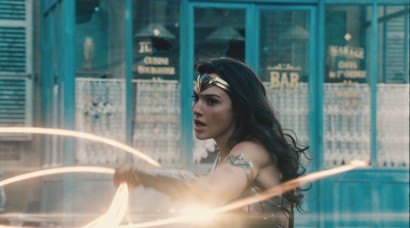‘Wonder Woman’ Box Office Take Proves Audiences Get Strong, Nurturing Female Heroes
by Heather Robinson

From The NY Observer

Late last month, after Titanic director James Cameron characterized this summer’s hit film Wonder Woman as “a step backwards” for women, and called the film’s protagonist, played by Israeli actress Gal Gadot, an “objectified icon,” the film’s director Patty Jenkins—inferring that Cameron had a problem with the character’s nurturing, traditionally feminine personality—took to Twitter to respond.
Jenkins wrote, “If women have to always be hard, tough, and troubled to be strong, and we aren’t free to be multi-dimensional or celebrate an icon of women everywhere because she is attractive and loving, then we haven’t come very far have we.”
Following this “battle of the directors,” audiences at the box office delivered an overwhelming verdict: a hands down victory for Jenkins.
The continued success of Wonder Woman—which has crossed the $800 million mark in combined domestic and international ticket sales, outpacing most of the recent male-dominated superhero films—proves that audiences all over the world want to see a strong female lead. An alpha girl, if you will, who retains her sensitivity, femininity, and nurturing instincts.
Cameron’s out-of-touch-sounding comments, Jenkins’s reply, and the social media battles that ensued may have fueled ticket sales, including in Japan, where the film had an exceptionally strong opening weekend at the end of August.
Clearly, many parents worldwide are taking their daughters, and sons, to see this film. Wonder why? Perhaps because it presents a vision of female strength consistent with what many might consider more traditional femininity.
Attractive and loving are apt descriptors for Jenkins’s incarnation of Wonder Woman, who comes across in the film as deeply compassionate, at times emotional, argumentative, and sensitive. She delights over babies. She comforts shell-shocked men. She is ambitious, but she is more than just her ambitions. She can fight when necessary, but she is not afraid to be vulnerable, and to show love.
Much of the film is set during World War I, a time of great suffering and chaos. At one point, when Wonder Woman disregards her male companions’ objections and charges, like an armor-clad Princess Diana, across a ravaged stretch of no-man’s-land to save desperate civilians, I heard gasps in the theater.
Jenkins’s Wonder Woman has given audiences a reminder that even in a harsh world, the “soft power” of sensitivity and compassion can disarm.
It’s come not a moment too soon. This summer has seen the release of films like Atomic Blonde, in which Charlize Theron plays emotionally hardened M16 agent Lorraine Broughton, who beats men to a pulp by the dozens, and the comedy Rough Night, in which a group of women celebrating a bachelorette party accidentally kill a male stripper, then scramble to dispose of his body.
Hearing one woman remark, “It was so awesome to watch her kick ass!” after a showing of Atomic Blonde in New York City, I began to wonder, are some young women buying into a vision of female strength that dispenses with feelings—and decency?
Not many of the Type-A female protagonists in today’s biggest hit films and television shows are particularly loving, nurturing, or kind. And temperament aside, in terms of their values, they are not good people.
Whether the murderous, backstabbing Cersei on HBO’s hit fantasy series “Game of Thrones” or the ice-veined power player Claire Underwood on Netflix’s political thriller “House of Cards,” it seems this era’s leading ladies are in a race to out-evil each other.
Granted, this is all fiction, but to the extent it reflects our cultural values, how feminist, or healthy, is it?
Of course, the vengeful female lead is nothing new. From the ancient Greeks, whose goddesses often acted with rage and spite, to Shakespeare’s Lady Macbeth, the angry, ambitious female protagonist is archetypal. But classic literature also abounds with positive depictions of strong, intelligent females who were drivers in their own lives and the world, and had loving and compassionate hearts: think Antigone, Demeter, Juliet, Jo March, Elizabeth Bennet, Jane Eyre.
The good news is that creative types are figuring out that a strong female does not need to be heartless or hardened. The success of the British drama Happy Valley, (offered on Netflix in the U.S.), which features a female cop’s fight to avenge her daughter’s death, is down to the mix of the muscular and maternal. And last year’s Oscar-nominated film Hidden Figures, which chronicled three mathematically gifted African-American women’s contributions to the NASA space program in the early 1960’s, told the true story of these ambitious women’s work to advance their own careers and lives, contribute to a larger national goal, and remain good family women, and friends.
It’s a message that resonates with women filmgoers. Hollywood appears to be catching on to what real people have known for a long time: powerful women don’t need to lose their nurturing, compassionate hearts to command respect, and to inspire.
This entry was written by Heather Robinson and posted on September 12, 2017 at 12:10 pm and filed under Commentary. permalink. Follow any comments here with the RSS feed for this post. Keywords: . Post a comment or leave a trackback: Trackback URL. */?>



